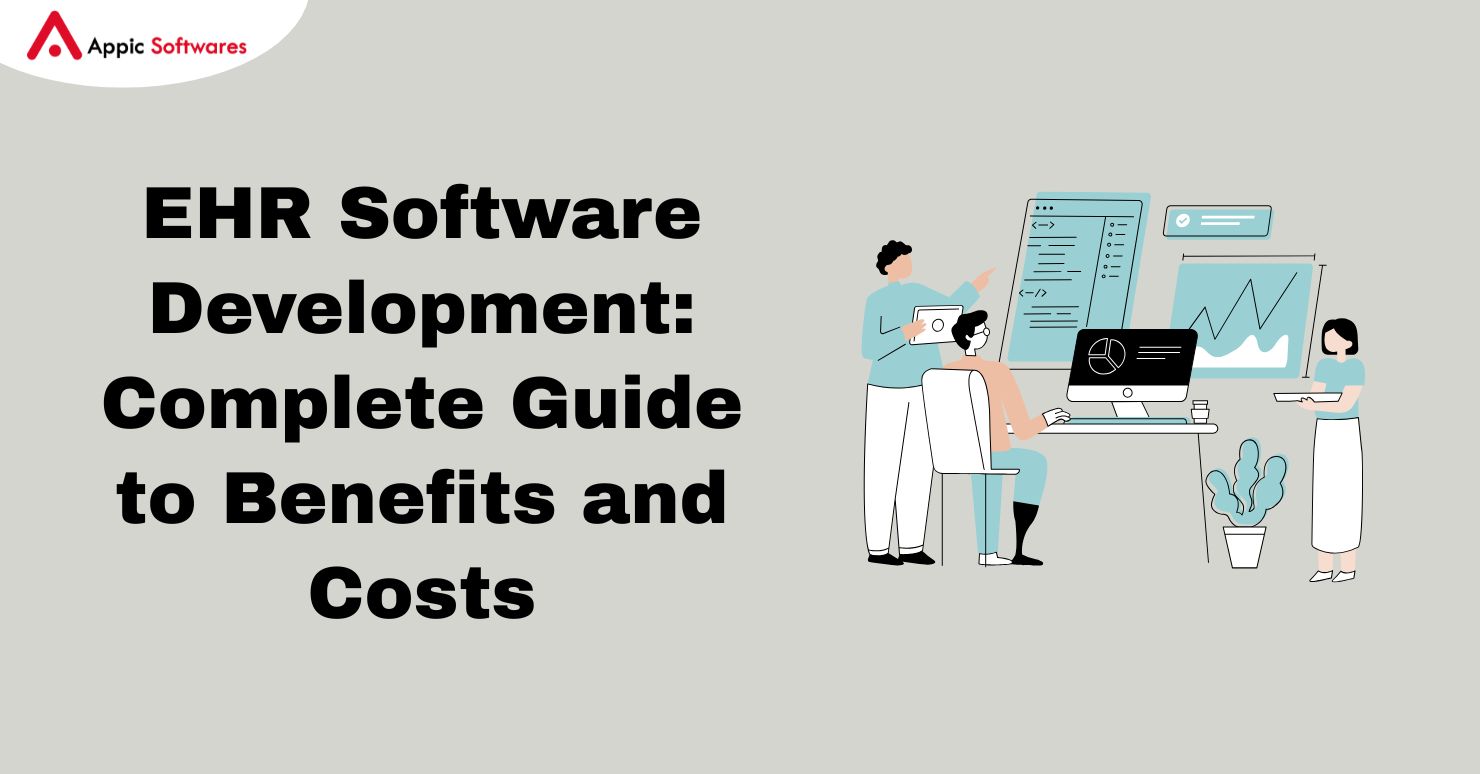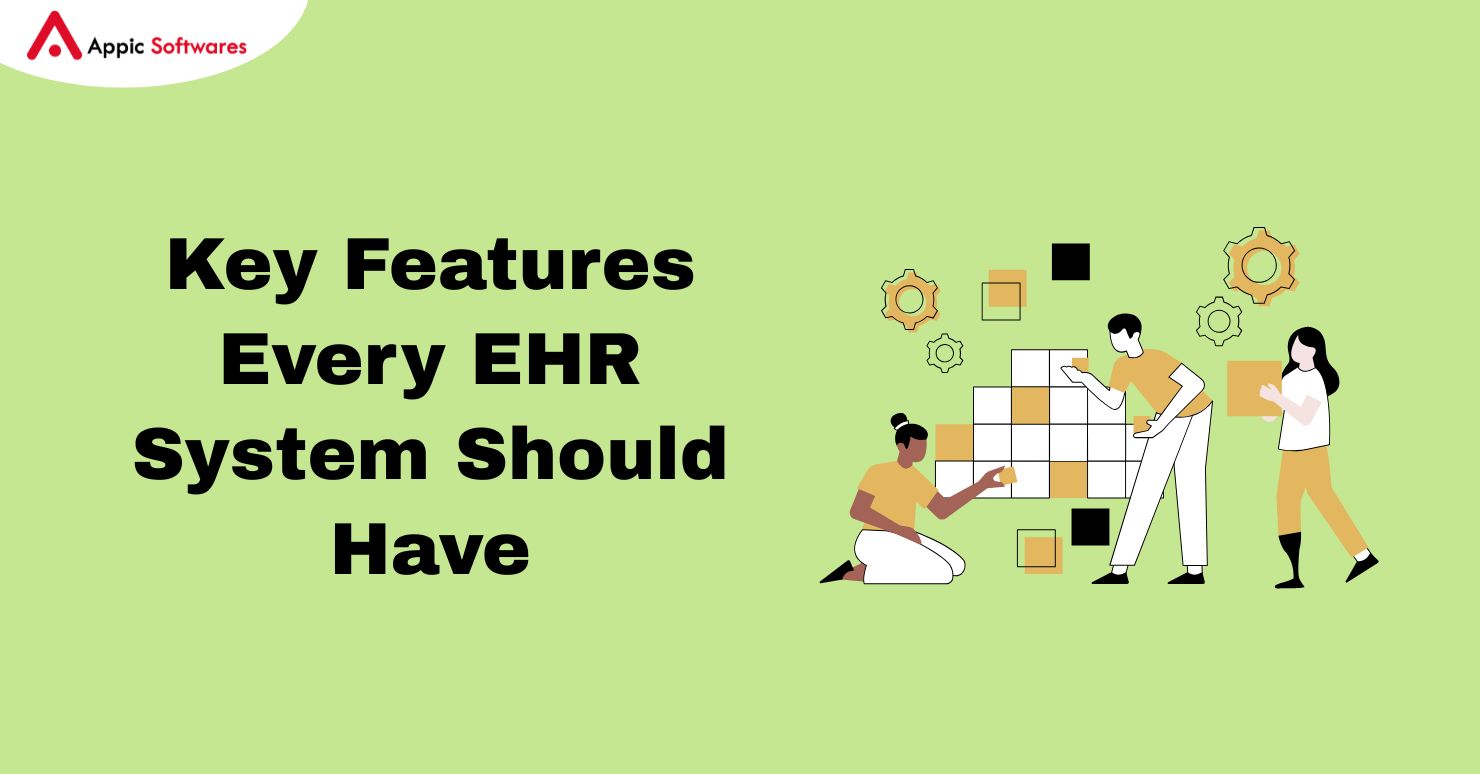
Electronic Health Records (EHR) software has changed how healthcare professionals keep track of, manage, and communicate patient information. Hospitals, clinics, and individual doctors must now invest in a strong EHR system in order to provide safe and efficient treatment for their patients.
But there are usually two significant questions for healthcare providers and entrepreneurs that are thinking about making EHR software: What will it do for them? What will it cost?
The Office of the National Coordinator for Health Information Technology (ONC) says that around 78% of doctors in the U.S. now utilize an EHR system. This shows how common and important these platforms have become.
This guide will teach you all you need to know about making EHR software, including what it is, how it can help healthcare organizations, the different types of EHR systems, the most significant features, the development process, and, most importantly, the price.
Understanding EHR Software
EHR software is a digital platform that stores a patient’s complete medical history. Unlike paper-based records, EHRs are accessible from multiple locations and can be updated in real time. They contain critical information such as patient demographics, diagnosis history, lab test results, treatment plans, prescriptions, and medical images.
Modern EHR systems also integrate with other healthcare applications, allowing different healthcare professionals to collaborate seamlessly. This means a specialist, primary care physician, and lab technician can all access the same patient record instantly.
For healthcare organizations, EHR software is more than just a record-keeping tool, it’s a central hub for managing patient care, streamlining workflows, and ensuring regulatory compliance.
Bonus read: AI in real estate examples
Why Healthcare Providers Are Moving Towards EHR Systems
Over the past decade, the healthcare industry has been under constant pressure to improve patient outcomes, reduce operational inefficiencies, and ensure data security. Paper-based records have too many limitations, they are time-consuming to update, prone to loss or damage, and make information sharing difficult.
EHR systems solve these problems. They allow for real-time updates, data sharing between departments, automated reporting, and secure patient information storage.
In many countries, governments have even introduced incentives or mandates for healthcare providers to adopt EHR systems. For example, in the US, the HITECH Act accelerated the adoption of EHRs by offering financial rewards for “meaningful use” of certified systems.
Benefits of EHR Software Development
The benefits of EHR software go beyond convenience. They directly impact the quality of care, patient satisfaction, and financial performance of healthcare facilities.
Improved Patient Care
EHR systems give doctors immediate access to accurate patient data. This means they can make faster and better-informed decisions. For example, if a patient is allergic to a specific medication, the EHR can alert the physician instantly before prescribing it.
Streamlined Workflow for Healthcare Staff
Administrative tasks like scheduling appointments, managing billing, or sending follow-up reminders are automated. This reduces paperwork and frees up healthcare staff to focus more on patient care.
Enhanced Collaboration Between Providers
When multiple specialists are involved in a patient’s care, the EHR acts as a shared workspace. Each provider can view and update the record, ensuring everyone is working with the latest information.
Regulatory Compliance and Security
EHR systems can be built to comply with industry regulations such as HIPAA (US) or GDPR (EU). This ensures sensitive health data remains private and secure, protecting both the patient and the healthcare provider from legal risks.
Data-Driven Decision Making
EHRs generate valuable data analytics that help organizations identify trends, track treatment outcomes, and improve long-term strategies. For example, hospitals can track the average length of stay for certain conditions and adjust their care protocols accordingly.
Bonus read: Hire indian developers
Types of EHR Software
Understanding the different types of EHR software is crucial before starting development.
Cloud-Based EHR
These systems are hosted on remote servers and accessed through the internet. They require lower upfront investment and are easier to scale, making them popular among small and medium-sized practices.
On-Premise EHR
This system is installed locally on a hospital’s servers. It offers more control over data but comes with higher initial costs and maintenance responsibilities.
Specialty-Specific EHR
These are tailored for specific medical fields such as pediatrics, cardiology, or dental care. They include features and templates unique to those specialties.
Open-Source EHR
These are customizable platforms that can be modified according to the healthcare provider’s needs. They offer flexibility but require technical expertise for customization.
You may like reading: Tinder clone
Key Features Every EHR System Should Have

When developing EHR software, certain features are non-negotiab
le.
Patient Record Management
Centralized storage of all patient data, including medical history, allergies, diagnoses, and test results.
Appointment Scheduling
Integrated calendars for booking, rescheduling, and sending reminders to reduce no-shows.
E-Prescription
Allows doctors to send prescriptions electronically to pharmacies, minimizing errors.
Lab Integration
Automatic import of lab results into the patient’s record for quick review.
Billing and Insurance Management
Streamlined medical billing, insurance claims processing, and payment tracking.
Data Security
Advanced encryption, access controls, and audit logs to ensure patient data privacy.
Reporting and Analytics
Tools to generate reports for patient outcomes, operational efficiency, and compliance tracking.
The EHR Software Development Process
Creating an EHR system is a multi-step process that requires close collaboration between healthcare providers, developers, and compliance experts.
Requirement Analysis
The first step is gathering detailed requirements from the client. This includes understanding the size of the healthcare facility, its existing sy
stems, preferred workflows, and compliance requirements.
Design and Prototyping
Developers create wireframes and prototypes to visualize the system’s interface and features. This ensures the final product matches the client’s vision.
Development
This stage involves coding the application, setting up the database, integrating third-party tools (like lab systems), and implementing security protocols.
Testing
The software is tested for performance, usability, and security. This stage also includes checking compliance with healthcare regulations.
Deployment
Once approved, the EHR system is deployed to the client’s servers or cloud platform.
Training and Support
Staff members are trained to use the system effectively. Ongoing technical support ensures smooth operations and regular updates.
How Much Does It Cost to Develop EHR Software?
The cost of EHR software development can vary greatly depending on complexity, features, and technology stack.
A basic EHR system with core features like patient management, scheduling, and e-prescriptions might cost between $40,000 and $80,000.
A mid-level system with advanced integrations (lab results, analytics, billing) can range from $80,000 to $150,000.
A fully customized EHR solution with AI-driven decision support, telemedicine integration, and large-scale data analytics can exceed $250,000.
Ongoing costs include software maintenance, cloud hosting (if applicable), and regular security updates.
Factors Affecting EHR Development Costs
Several factors influence the total cost:
-
Feature Set: More features mean more development hours.
-
Type of EHR: Cloud-based systems usually cost less upfront than on-premise ones.
-
Customization: Tailoring the system to a specific specialty or workflow increases complexity.
-
Compliance Requirements: Meeting strict security and regulatory standards adds to development time.
-
Team Location: Developer rates vary widely across countries.
Why Partnering with an Experienced EHR Development Company Matters
EHR software development is not just about coding, it’s about understanding healthcare workflows, patient safety, and compliance. Working with a team experienced in healthcare software ensures the final product meets your needs and regulatory requirements.
A reliable development partner like Appic Softwares will guide you through requirement analysis, design user-friendly interfaces, implement robust security, and provide long-term support.
Final Thoughts
EHR software development is a strategic investment for healthcare organizations aiming to improve efficiency, patient care, and compliance. While the costs can be significant, the long-term benefits in terms of improved patient outcomes, reduced administrative workload, and better data management far outweigh the initial expenses.
If you are ready to explore EHR software development for your healthcare organization, partnering with the right development company like Appic softwares can help you build a secure, scalable, and user-friendly system tailored to your specific needs.
FAQs
1. How long does it take to develop custom EHR software?
The timeline depends on the complexity of the features you want. A basic EHR system with standard functions like patient records, scheduling, and basic reporting may take around 4 to 6 months. If you want advanced features like AI-powered diagnosis support, telehealth integration, and multi-device compatibility, it can take 8 to 12 months or more. Working with an experienced development team can help you speed up the process without compromising quality.
2. Is it better to buy ready-made EHR software or a custom one?
Ready-made EHR software is quicker to get started with and often cheaper upfront. But it may not fully fit your workflow or scale as your practice grows. A custom EHR solution is built exactly for your needs and can adapt as your business changes, but it requires more time and investment initially. If you want a long-term solution that gives you control over features, security, and integrations, custom development is the better choice.
3. How much does EHR software development cost?
The cost can vary widely. A simple EHR system might cost between $30,000 and $60,000, while a feature-rich solution with advanced tools can range from $80,000 to $200,000 or more. The final price depends on the complexity, technology stack, compliance requirements, and the hourly rates of the development team. Investing in the right features from the start can save you money on future upgrades.


